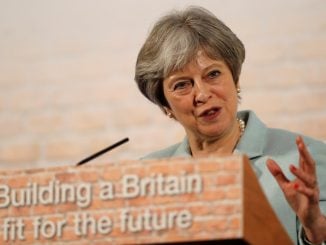
LONDON — Britain said Monday it is postponing the start of post-Brexit border checks on goods going to Northern Ireland, as it seeks breathing space in its tense standoff with the European Union over trade rules.
Brexit Minister David Frost said the government would continue to trade “on the current basis,” maintaining grace periods that the U.K. gave itself after splitting from the EU’s economic embrace at the end of 2020. He did not set a new end date for the grace periods, some of which had been due to finish on Sept. 30.
Frost said the standstill would “provide space for potential further discussions” with the EU over the two sides’ deep differences on the Brexit divorce agreement.
U.K.-EU relations have soured over trade arrangements for Northern Ireland, the only part of the U.K. that has a land border with the 27-nation bloc. The divorce deal the two sides struck before Britain’s departure means customs and border checks must be conducted on some goods moving between Northern Ireland and the rest of the U.K.
The regulations are intended to prevent goods from Britain entering the EU’s tariff-free single market while keeping an open border between Northern Ireland and EU member Ireland — a key pillar of Northern Ireland’s peace process. But the checks have angered Northern Ireland’s British unionists, who say they amount to a border in the Irish Sea and weaken Northern Ireland’s ties with the rest of the U.K.
One of the deferred measures, which had been due to take effect Oct. 1, would ban chilled meats such as sausages from England, Scotland and Wales from going to Northern Ireland. The “sausage war” has been the highest-profile element of the U.K.-EU dispute, raising fears that Northern Ireland supermarkets may not be able to sell British sausages, a breakfast staple.
The trade tensions have destabilized Northern Ireland’s delicate political balance and raised tensions with the EU, which is calling for Britain to implement the deal it agreed to, and with the U.K. government, which says the rules need fundamental reform.
Britain’s Conservative government is seeking to remove most checks, replacing them with a “light touch” system in which only goods at risk of entering the EU would be inspected.
Frost warned last week that the U.K. and the EU risked entering a long period of “cold mistrust” unless issues around the agreement were resolved.
The U.K.’s previous unilateral extension of the grace period angered the EU, which responded by launching legal action. The bloc has since put that action on hold, and the two sides have taken tentative steps to cool the situation. Monday’s announcement by Britain was made with the advance knowledge of the bloc.
Ireland’s Deputy Prime Minister Leo Varadkar said he expected the EU would agree to an extension of the grace periods in order to allow for “deep and meaningful” talks with Britain.



